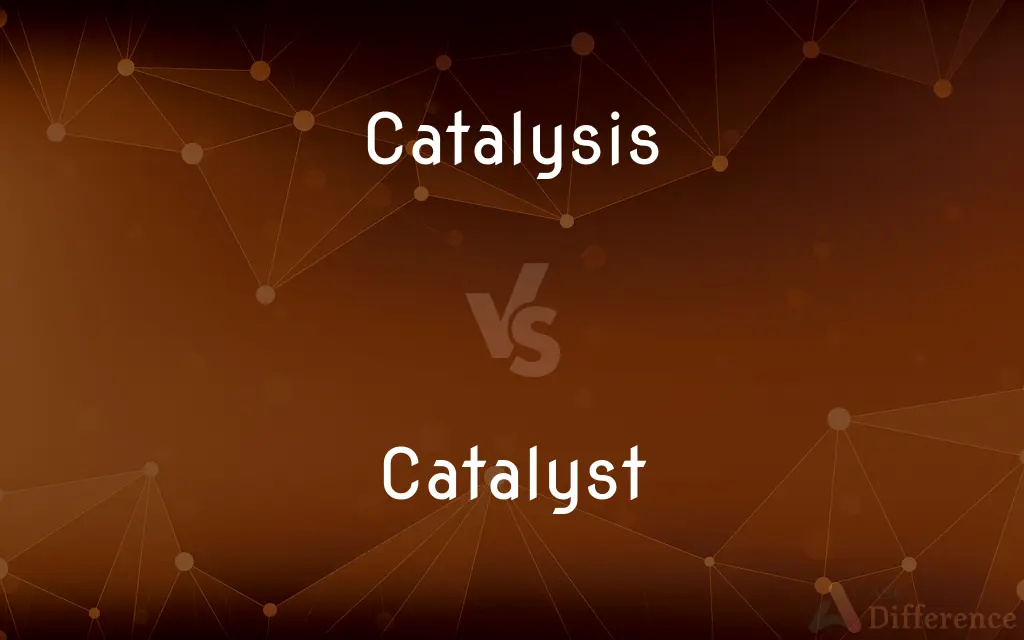Catalysis vs. Catalyst — What's the Difference?

Difference Between Catalysis and Catalyst
ADVERTISEMENT
Compare with Definitions
Catalysis
Catalysis () is the process of increasing the rate of a chemical reaction by adding a substance known as a catalyst (). Catalysts are not consumed in the reaction and remain unchanged after it.
Catalyst
A substance that increases the rate of a chemical reaction without itself undergoing any permanent chemical change
Chlorine acts as a catalyst promoting the breakdown of ozone
Catalysis
The acceleration of a chemical reaction by a catalyst.
Catalyst
(Chemistry) A substance, usually used in small amounts relative to the reactants, that modifies and increases the rate of a reaction without being consumed in the process.
Catalysis
The action of a catalyst, especially an increase in the rate of a chemical reaction.
ADVERTISEMENT
Catalyst
One that precipitates a process or event, especially without being involved in or changed by the consequences
"A free press ... has remained ... a vital catalyst to an informed and responsible electorate" (Robert O'Neal).
Catalysis
(chemistry) The increase of the rate of a chemical reaction, induced by a catalyst.
Catalyst
(chemistry) A substance that increases the rate of a chemical reaction without being consumed in the process.
Catalysis
Dissolution; degeneration; decay.
Sad catalysis and declension of piety.
Catalyst
Something that encourages progress or change.
Economic development and integration are working as a catalyst for peace.
Catalysis
A process by which a chemical reaction is accelerated in the presence of certain agents which were formerly believed to exert an influence by mere contact. It is now believed that such reactions are attended with the formation of an intermediate compound or compounds, so that by alternate composition and decomposition the agent is apparenty left unchanged; as, the catalysis of making ether from alcohol by means of sulphuric acid; or catalysis in the action of enzymes (as diastase, or ptyalin) on starch.
Catalyst
(literature) An inciting incident that sets the successive conflict into motion.
Catalysis
Acceleration of a chemical reaction induced the presence of material that is chemically unchanged at the end of the reaction;
Of the top 50 commodity chemicals, 30 are created directly by catalysis and another 6 are made from raw materials that are catalytically produced
Catalyst
(automotive) A catalytic converter.
Catalyst
(fantasy) An object that facilitates the casting of a spell (such as a magic wand).
Catalyst
A substance that initiates or accelerates a chemical reaction without itself being affected; as, thousands of enzymes serve in concert as calaysts to produce the sequence of reactions we call "life"; the industrial production of cheap ammonia depended on finding a good catalyst.
Catalyst
Something that serves as a precipitating occasion for an event; as, the invasion acted as a catalyst to unite the country.
Catalyst
Something or someone that causes events to happen with itself being changed.
Catalyst
(chemistry) a substance that initiates or accelerates a chemical reaction without itself being affected
Catalyst
Something that causes an important event to happen;
The invasion acted as a catalyst to unite the country
Share Your Discovery

Previous Comparison
Arid vs. Dry
Next Comparison
Salary vs. Payroll














































